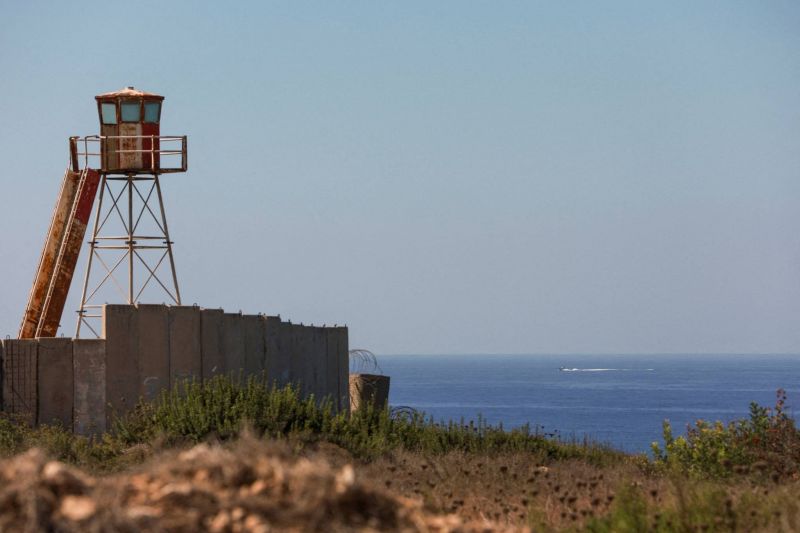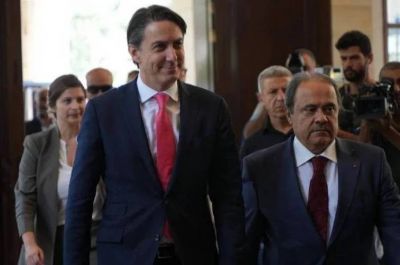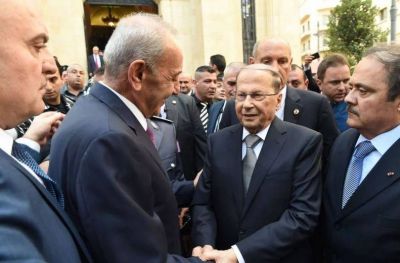
A deserted post for the Lebanese army is seen in Naqoura, near the Lebanese-Israeli border, southern Lebanon, October 6, 2022. (Credit: REUTERS/Aziz Taher/File Photo)
BEIRUT/JERUSALEM — Lebanon and Israel have reached a historic agreement demarcating a disputed maritime border between them, Israeli Prime Minister Yair Lapid said on Tuesday. Lebanese president Michel Aoun also said Tuesday he hopes a deal would be officially announced "as soon as possible."
In the evening, US President Joe Biden congratulated Aoun on the conclusion of negotiations, via a phone call.
While limited in scope, the deal would mark a significant compromise between states with a history of war, opening the way for offshore energy exploration and easing a source of recent tensions between states.
"This is a historic achievement that will strengthen Israel's security, inject billions into Israel's economy, and ensure the stability of our northern border," Lapid said in a statement.
Aoun said earlier that the terms of the final draft received from US envoy Amos Hochstein satisfied Lebanon and he hoped the deal would be announced "as soon as possible," the presidency said in a statement seen by Reuters.
Hochstein has been shuttling between the sides, which have no diplomatic relations.
Israeli National Security Advisor Eyal Hulata earlier also gave a positive assessment: "All our demands were met, the changes that we asked for were corrected. We protected Israel's security interests and are on our way to a historic agreement," he said in a statement.
Israeli Defense Minister Benny Gantz said, according to the Jerusalem Post, that his country "is interested in having a stable and prosperous Lebanese neighbor." Despite Hezbollah's approval of the deal, Gantz accused "the terrorist organization" of trying "to destroy the process."
Gantz also promised the agreement will be presented to the Israeli public in a transparent and clear manner, and argued that it is "just and positive for both sides."
"We have not and will not compromise on a single millimeter that is critical to our security,” he added. "We will continue protecting our security interests in any scenario and ensuring the security of the citizens of Israel."
For their part, Lebanon's Hezbollah, a powerful armed movement that considers Israel its sworn enemy, green-lit the deal, two senior Lebanese sources said on Tuesday.
One senior Lebanese government official and one official close to Hezbollah said the party had "agreed" to the terms of the deal and considered negotiations "over."
Hezbollah leader Sayyed Hassan Nasrallah, whose group has fought numerous wars with Israel, has also repeatedly warned of an escalation if the deal does not secure Lebanon’s maritime rights. Nasrallah is due to make an address later on Tuesday.
Earlier, Lebanese negotiator Elias Bou Saab told Reuters that if everything went well, Hochstein's "efforts could imminently lead to a historic deal." Lebanon felt the latest draft "takes into consideration all of Lebanon's requirements and we believe that the other side should feel the same," he said.
And after meeting with Lebanese president Michel Aoun, Bou Saab said that US proposal "gives Lebanon all its rights."
'Victory for Lebanon'
After meeting with Aoun, caretaker Prime Minister Najib Mikati thanked "the Lebanese team that helped in the study of the agreement as well as the US administration and French President Emmanuel Macron, in particular, for what they did with Total."
"It was agreed to start the exploration stages immediately after the final agreement," Mikati added.
Following a weekly meeting of the Aounist parliamentary group, Free Patriotic Movement leader Gebran Bassil said for his part that the demarcation of the maritime border between Lebanon and Israel is "a victory for Lebanon and the culmination of a long road."
Bassil gave credit "to the tireless work of the Ministry of Energy since 2009," when he headed the ministry. He also said the agreement "could have been accomplished in 2013 if obstacles had not been placed inside [the country] and pressure from abroad had not been exerted."
While Israel has moved ahead with production and export, Lebanon's efforts have been hamstrung by political dysfunction.
A gas find would be a major boon for Lebanon, which has been mired in a financial crisis since 2019. Eventually, such a discovery could fix Lebanon's long-standing failure to produce adequate electricity for its population.
TotalEnergies, which is part of a consortium to explore potential oil and gas blocks off the Lebanese coast, is expected to explore and exploit the Qana field for Lebanon. However, this field extends southwards beyond the area bordered by Line 23, which is claimed by Lebanon. TotalEnergies is expected to play the role of intermediary between the two countries by paying a fee to Israel in exchange for the country ceding full access to the Qana field to Lebanon.
Laurent Vivier, Senior Vice President for the Middle East and North Africa at TotalEnergies, arrived in Lebanon Tuesday morning, the state-run National News Agency reported.
After a meeting at the Grand Serail between the TotalEnergies delegation and caretaker Lebanese Prime Minister Najib Mikati, the outgoing head of government asked the French group to start "immediately" the exploration drilling in its waters.
"The logistical issues require time, but the work will start immediately," said caretaker Energy Minister Walid Fayad, who attended the meeting.
Reporting by Timour Azhari and Laila Bassam in Beirut; Maayan Lubell in Jerusalem; Writing by Timour Azhari/Tom Perry and Maayan Lubell; Editing by Leslie Adler, Chris Reese, Raju Gopalakrishnan, Philippa Fletcher

